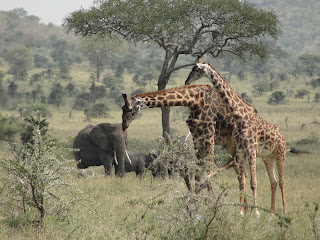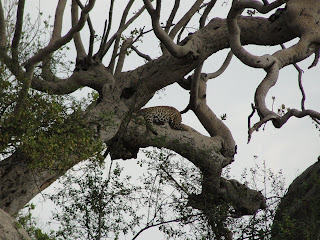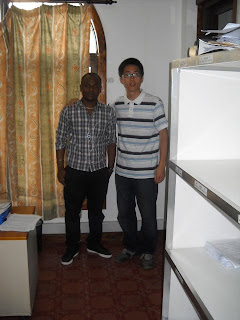
Damn it's good to be home. Good to be home because here, I can walk around without being called a "chino" all the time - in the U.S., people only think I'm Chinese and that's a big difference. Also good to be home because my home is Southern California, and Southern California has authentic Mexican food, which I haven't had in a long time, and authentic Mexican girls to order them with me, which I haven't... yeah. But home is home, no matter the latitude and longitude, and I had been away from mine for far too long. It's good to be back, fam.
My return journey to the States, which spanned more than 24 hours inside cabin doors across five cities, went as smoothly as my pick-up lines for all but one stop. As I passed through security at JFK Airport, the TSA official womanning the carry-on X-ray machine vigilantly but mistakenly nabbed the Nicaraguan coffee stowed away in my backpack for the dark, powdery goodness it shares with a far more nefarious substance. For some reason, she must've not taken me for a delinquent youth trapped in a lifestyle of wheeling and dealing for tuition fees because her method of divining its identity was to administer only a quick sniff. Still counts as scientific method, I suppose, although a conniving cartel leader who reads this blog (probably has a tattoo that reads "Surk14") could now easily traffic cocaine to homies all over the world by giving it some coffee aroma.
Anyway, on we proceed with my adventures in Tanzania. Our next stop is Serengeti National Park, a place I never thought I'd get to visit in my lifetime. All in all, it's probably the most beautiful sliver of the natural world I've seen, if we set the scale of a sliver to a full rotation panorama, etchable in our retinas only in discrete frames. The conditional statement is probably necessary because I've been blessed to come face-to-face with some pretty incredible wonders of the world - Grand Canyon, Sedona, the Canadian Rockies, and Bahia de las Aguilas Beach in the Dominican Republic come to mind - that command their fair share of desktop wallpapers. But it's also because when I am walking in the fields behind my apartment complex at dusk, smelling the greenery, faint perfumes of passerbys, and barbecued meats in back yards unseen, feeling the wave of warmth generated from all that life, and watching the violet, vermillion, and cobalt of sunset, dulled by the granular slate of Los Angeles smog, tint the grass a thick metallic glow, I think it's pretty wonderful as well. And you could not tell from my endorphin levels where I'm wylin out.
But Serengeti is Serengeti for a reason, and I found myself in otherworldly landscapes unlike any I had seen before. For about the first half hour of the drive from the park entrance, our 4X4 vehicle traversed a vast sea of brown prairie grass entirely uninterrupted in all directions; the world was endless, flat plains and sky that met in a neat line. Then an invisible painter began to add signs of other life - termite mounds, riots of stubborn shrubbery, and giant trees with lush cover - but so sparsely such that each of them stood utterly alone and no more than one occupied a single field of vision. The eeriness of the scene was only allayed when I noticed crepuscular rays streaming through some cloud cover. The sky was so grotesquely large and the rays radiating from a point so far away that the light ceased to be light and became a barely visible wrinkle of space, a slow decay of hadrons into quarks. Most of these gossamer threads disappeared into the sea of grass, but I saw one kiss a lonely tree, as if the tree existed because it had been the benefactor of some vital essence in the light. It must be a blessing and a curse, I thought to myself, to flourish but flourish alone.
As we ventured deeper into the park, Serengeti became anything but uniform. The grasses yielded space to dense communities of towering trees, thorn bushes, and even wildflowers, and the brown dissolved into every shade of yellow and green imaginable. There were archipelagos of rocks, red clay valleys, rivulets and watering holes, and vast, gently sloping hills that unfurled millions of trees with capillary branches and brain canopies like Murakami's mushrooms. And then there were animals. A lot of them. There are no words to describe the feeling of being surrounded by thousands of zebras and wildebeest. So even though the pictures don't do justice, they will do a better job from here. Get your PokeDex out, boys and girls.
Baboon

According to National Geographic, baboons "have a taste for meat" and "eat birds, rodents, and even the young of larger mammals." According to my friend in elementary school, baboons can also rip your balls off with their hands. Now I'm a grown ass man at the age of 21, but I don't feel confident, with my 5'8'' frame, that I can necessarily convince an adult baboon to leave me alone. So when one jumped inside our 4X4 vehicle through the pop-up roof and perched 2 feet away from me, I was practicing the guillotine choke in my head. Luckily, no submission attempt was made, as our driver's honk scared it away.
Vervet Monkey

This one probably can't rip my balls off.
Ostrich

An ostrich in Tanzania!
Dangerous Birdies


The bottom one looks scarier. Probably a male because it wanted my sandwich.
Gazelles


Gazelles are one of the most common animals you can find in Serengeti but I never tired of seeing them. Very elegant and probably impossible to catch unless you are a cheetah. I witnessed a stare-down between a pride of female lions and a herd of gazelles - the gazelles broke off into a run as soon as a lion attempted anything close to a trot.
Zebra


Zebras are one of the most common animals you can find in Serengeti, and I tired of seeing them. Also, one of them chased me to the bathroom on my last night of camping.
Wildebeest


I missed their famous annual migration to Kenya, but for someone who had never seen a single wildebeest before, sights like the above were just mind-blowing.
Warthog

It's pretty amazing that the creators of Lion King made a hero out of this animal.
Elephant

Chances are you will get to see an elephant in your lifetime even if you don't get to Tanzania, and that's a good thing because elephants are so damn lovable.
Giraffe

I still have yet to see a giraffe in any kind of hurry or distress. So it's like the Confucius or Buddha of the animal kingdom but it's too tall.
Gator

Crocodile or alligator?
Hippo

Seeing a hippo out of water is about as rare as seeing me without a shirt on.
Jackal and Hyena


Both low-tier carnivores that scavenge on the leftovers of lions.
Leopard

Spends most of the day sleeping on trees...
Lion


I'm a grown ass man at the age of 21, but I felt pretty awkward when this happened. I mean, does the male lion really expect the female to carry him on her back just because he is tired? Pitiful. But watching the lions do it, I have to say, was kind of reassuring because even the king and queen of the Serengeti kingdom are figuring love out. Even though the male's expression in the top picture screams triumph and conquest, I can tell you he lasted maybe 7 seconds in that lionny position. I can also tell you that in his frustration, he attempted to swallow the female's head whole and the female, equally frustrated with his timing and flaccid underachievement, dropped to the prairie grass and writhed in disappointment. Relationships ain't easy, mane.
























